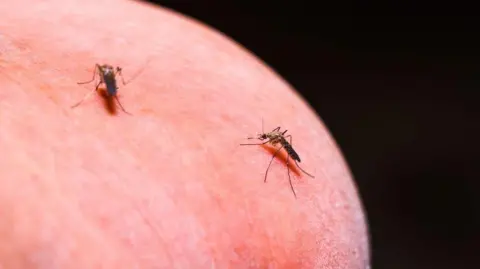Health experts and researchers continually strive to combat the deadly disease of malaria, which claims the lives of nearly 600,000 individuals annually—mostly children. In a promising new approach highlighted by scientists from Harvard University, it has been proposed that mosquitoes can be treated with malaria medications to clear their infections, thereby preventing them from transmitting the disease. The findings were recently unveiled in a study published in the esteemed journal *Nature*.
Current strategies for tackling malaria primarily focus on killing mosquitoes using insecticides, but recent trends indicate that many mosquito populations have developed resistance to these chemicals. This resistance significantly hampers the effectiveness of conventional insecticidal methods, resulting in a growing need for alternative approaches. Dr. Alexandra Probst, a researcher involved in the study, emphasized that merely killing mosquitoes is no longer efficient; thus, a new methodology focusing on eradicating the malaria parasites residing within them is required.
The innovative research explored a technique whereby female mosquitoes that often transmit malaria could be treated with a specific combination of drugs. These drugs are absorbed through the legs of the mosquitoes and have shown great efficacy in eliminating the malaria parasites. The authors suggest coating bed nets with this drug cocktail as a long-term preventative measure against malaria transmission, potentially revolutionizing how we combat this disease.
Bed nets have historically been one of the most successful interventions in preventing malaria, especially since the main vectors of the disease, the malaria-carrying mosquitoes, are predominantly nocturnal. Not only do these nets serve as a physical barrier against insects, but they are also often treated with insecticides that kill mosquitoes upon contact. However, as noted, the efficacy of insecticides is declining due to widespread resistance.
During the research conducted by the Harvard team, they investigated the mosquito genome to identify vulnerabilities when the parasites infect them. Through a systematic screening process, they identified a shortlist of 22 potential drugs, ultimately narrowing it down to two highly effective medications that succeeded in killing all malaria parasites in controlled tests.
It is worth noting that the effectiveness of these drugs could last up to a year when applied to bed nets, potentially offering a cost-effective and sustainable alternative to insecticides. This presents a dual-layered approach to malaria prevention: not only do the nets physically obstruct mosquitoes, but they also condition them to be cleared of the malaria infection if they come into contact with the treated surfaces.
Future steps are underway, with plans for practical field testing scheduled in Ethiopia, designed to assess this innovative anti-malarial bed net strategy in everyday environments. Although it may take a minimum of six years to comprehensively evaluate the success of this novel approach, the implications of combining drug-treated nets with traditional insecticides could create a multi-faceted defense against malaria. This could provide an insurance policy of sorts; if one method fails due to resistance or other factors, the alternative can still impede the spread of the disease.
The findings of the Harvard researchers, coupled with existing preventive measures like vaccines, could mark a significant turning point in global health efforts aimed at diminishing the toll malaria takes, especially in high-risk areas. By addressing the parasites within mosquitoes rather than attempting to eliminate the mosquitoes themselves, we might uncover paths toward a more effective strategy in saving lives and reducing the prevalence of malaria worldwide.



